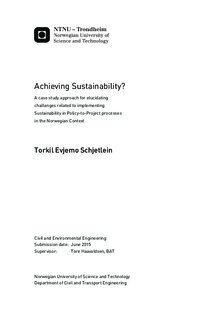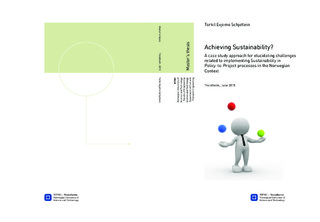| dc.description.abstract | The starting point of this study is a belief that methodology for evaluating projects can contribute to evidence-based decision-making and goal-oriented societal development. The purposes of this study is to elucidate challenges related to goal-oriented societal development in the form of policy-to-project processes, by exploring the application of a project perspective. The applied project perspective emphasise goal-hierarchy consistency and Sustainability as success criteria. A policy-to-project process is a process that transfers objectives from a strategic policy level to a project level. The study is focused on the evaluation of a policy-to-project case, the Brøset Project, by project evaluation methodology.
The Brøset Project is a high-profile environmental project selected as the sole case based on a most favourable case rationale. The Brøset Project has gained a lot of attention by establishing an unprecedented ambition for CO2 reduction. The project has also been publicly criticised and accused of being unrealistic and not in line with the market demand.
The study has identified the policies that justify the project and evaluated the consistency of the project s goal hierarchy based on the Strategic, tactical and Operational analytic levels. Furthermore, the stakeholder relations of the project have been analysed. The interviews have focused on mapping the policy-to-project process, understanding how the various objectives are prioritised by various stakeholders and how Sustainability is understood and implemented.
The results of this study indicate that the established project objectives do not provide reasonable probability for achieving the ambitions. Additionally, the project seem no to be in compliance with the Sustainability definition applied by this study. The project perspective seem not to be in line with how the stakeholders view the project, as the strategic objective emphasised in this study is not prioritised by the stakeholders. The stakeholders in general do not see sustainable development as practically relevant to the project, and key sustainability principles are deliberately disregarded. These findings represent significant challenges for goal-oriented societal development.
This study, consisting of a process report, an academic paper and appendixes, constitute a Master Thesis in Project Management at the Norwegian University for Science and Technology. | |

